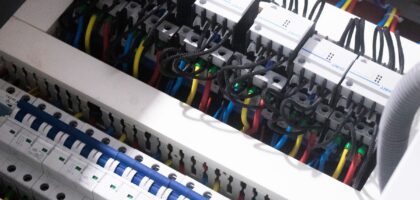
Course Title:
Basic Electrical Maintenance Course
Total Cost: £ 845.00
Entry Requirements
There are no formal entry requirements for this course.
No prior electrical knowledge is assumed. The structure of the course is aimed at those who may currently fulfil a maintenance role within industry.
It is aimed at those wishing to develop basic knowledge and skills within the electrical maintenance sector. All candidates must be at least 18 years of age.
Course Overview
The course is delivered using the following structure:
Delivery – 5 days teaching within a classroom/workshop environment. There will be both knowledge based activities in a classroom and then completing basic electrical circuits within an allocated bay – 8:30am till 4:00pm
Certification – On successful completion of the 5 day course a certificate of attendance will be awarded by Humber Electrical Training.
Course Content:
The course has extensive hands on approach with an emphasis on safe working practices at all times. It covers the understanding of motor principles and associated connected devices and equipment. You will develop practical skills within an electrical panel and complete relevant tests before commissioning your electrical system.
The course will cover the following key areas:
Requirements of Electricity at Work Regulations
Requirements for safe isolation
Demonstrate an understanding of basic electrical principles
Understand the importance of earthing, bonding, protection and associated protective devices.
Complete safe isolation of a 3 Phase, Neutral and Earth system using a GS38 voltage indicator unit and proving unit.
Work with a range of tools and equipment that will be used during electrical maintenance activities.
Work with a range of cables, bootlace ferrule crimps, cable markers and carryout correct terminations and connections.
Understand basic electrical schematic diagrams as an aid to maintenance activities.
Understand the operation and install a standard and solid state relay and how they interact with input and output devices.
Understand the most common types of motors used in industry and their applications.
Understand how to read the information from a motor nameplate and use this to confirm correct application and overload settings.
Understand and test a 3 phase induction motor to confirm satisfactory for continued use. This will include bench testing & field testing (Winding Resistance / Insulation Resistance).
Complete an Inspection and Test Record Sheet for a given motor.
Understand and install a Direct-On-Line (DOL) motor circuit and additional input/output devices that can be connected to enable efficient operation.
Use electrical test equipment effectively and carry out testing on a range of components such as relays, contactors, thermal overloads, motors, input/output devices
Diagnose basic faults and recognise the symptoms using a range of techniques including a clamp meter.
